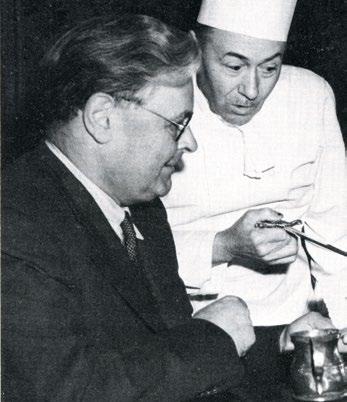
4 minute read
End of The Good Food Guide James Pembroke
Closing time
After 70 years, The Good Food Guide is no more. James Pembroke salutes the book that let the British complain about restaurants
Advertisement
Stop all the clocks … The Good Food Guide has ceased publication.
Waitrose, who bought the guide from Which? in 2013, has decided ‘to focus on our other publications, Waitrose Food and Waitrose Weekend’.
In common with Michelin and Time Out, they were giving all their hardearned information away for free on their website, and still are. Most people Google ‘restaurants near me’ and choose the one with the highest score out of five. That army of volunteer inspectors must now stand down.
I was brought up with the guides. My mother, always in pursuit of a bargain, used them to track down which restaurants would offer children half-portions at half-price. This brilliant concept – which introduced children to adult food – has been replaced by the infantilising tyranny of the kiddies’ menu and sweetened chicken nuggets.
The brainchild of Raymond Postgate (1896-1971), father of Oliver Postgate, of Ivor the Engine and Bagpuss fame, the first guide appeared in 1951. Not minding about food was our national condition and so we got the food we deserved.
Restaurateurs had become incredibly complacent, certain in the knowledge that two wars had taught us not to complain. Derek Cooper, author of The Bad Food Guide, believed it was due to British reserve: ‘An Englishman would rather submit to voluntary euthanasia than expose himself to the possibility of Raised Voices in Public.’
In Postgate, we got the gastronomic champion we deserved, a militant and relentless campaigner rather than a worldly gastronome – Egon Ronay, the Hungarian restaurateur, was to take up that position from 1959.
Postgate’s gastronomic credentials lay firmly in the English tradition. He dreamed not of the Provençal dishes beloved by Elizabeth David but of ‘lobsters in whisky, roast cygnet, salmon in cider and ormers’. His reputation as a connoisseur was due to wine expertise and, even then, his The Plain Man’s Guide to Wine was for the no-nonsense man on the street.
Postgate had always been an outsider. A conscientious objector in the First World War, he was on the far left of the Labour Party throughout the Twenties and Thirties. He was a Classics scholar who wrote effusively about John Wilkes.
In 1949, Stephen Potter, the author of the Gamesmanship books immortalised by Terry-Thomas, commissioned him to write an article on British catering for his magazine, the Leader. Postgate suggested a Society for the Prevention of Cruelty to Food to expose the rank offerings of UK eateries. He wouldn’t accept this was down to rationing, then at its peak, given that our island is surrounded by fish and seafood.
He wanted to encourage Brits to learn to fight against established practices, and food was his battleground. To achieve this, he formed an army, unsusceptible to bribes, who would root out the profiteers. And he succeeded. By 1966, he had 13,000 members submitting reports, and was selling over 100,000 copies.
Every Good Food Guide’s introduction exhorted readers to complain about poor food and poor service, and to check the bill assiduously: ‘If you can’t add, do at least scowl at it and look as if you are adding it up.’
He all but treated the trade as the enemy: eager to rip off its customers and willing to sue for libel if the truth was exposed. The last mention of libel threats against the guides was as late as 1979, and the two camps weren’t to work together for 30 years until 1982, when Albert Roux was invited to put the view of ‘the other side’.
Despite his self-congratulatory claims for having revived the restaurant trade, if anything Postgate succeeded in entrenching the mutual suspicion and animosity between staff and customer. In 1963, one report came in of a hotelkeeper who forced his guests to finish their dinner by 7.45pm because he wanted to watch something on the telly.
The guides are a brilliant record of our attitudes to food. Well into the 1960s, portion size seemed paramount in the members’ recommendations in The Good Food Guides. They rejoiced when ‘helpings were generous’ or there was ‘more than I could eat’. The chief inspector of The Good Food Guides complained as late as 1966, ‘A vast mass of our population, as far as I can make out, eat nothing but chips with absolutely everything.’
In his 1970 guide, Postgate complained, ‘There is still a decayed Puritan atmosphere in parts of Britain. It is considered no longer actually wrong but certainly ignoble to concern oneself passionately with the quality of food or wine.’
The 1990 Guide was full of woe: ‘There is an apparent lack of a restaurant culture in large parts of Britain.’
And yet, would London now be the capital of European gastronomy without that army of watchdogs?

Raymond Postgate (left), the ultimate guide to good food












